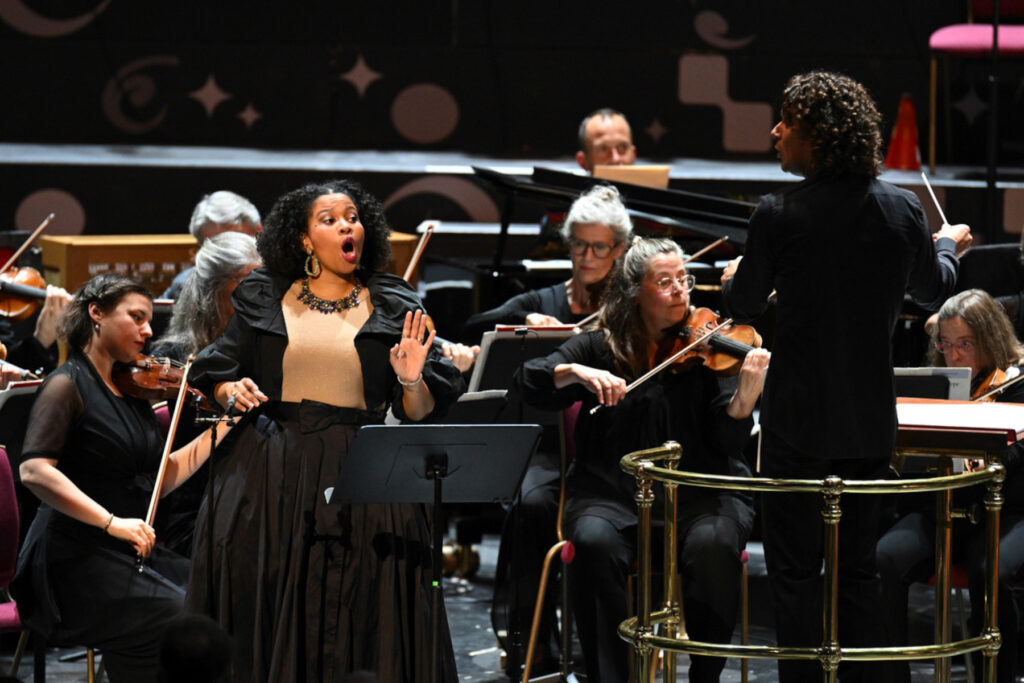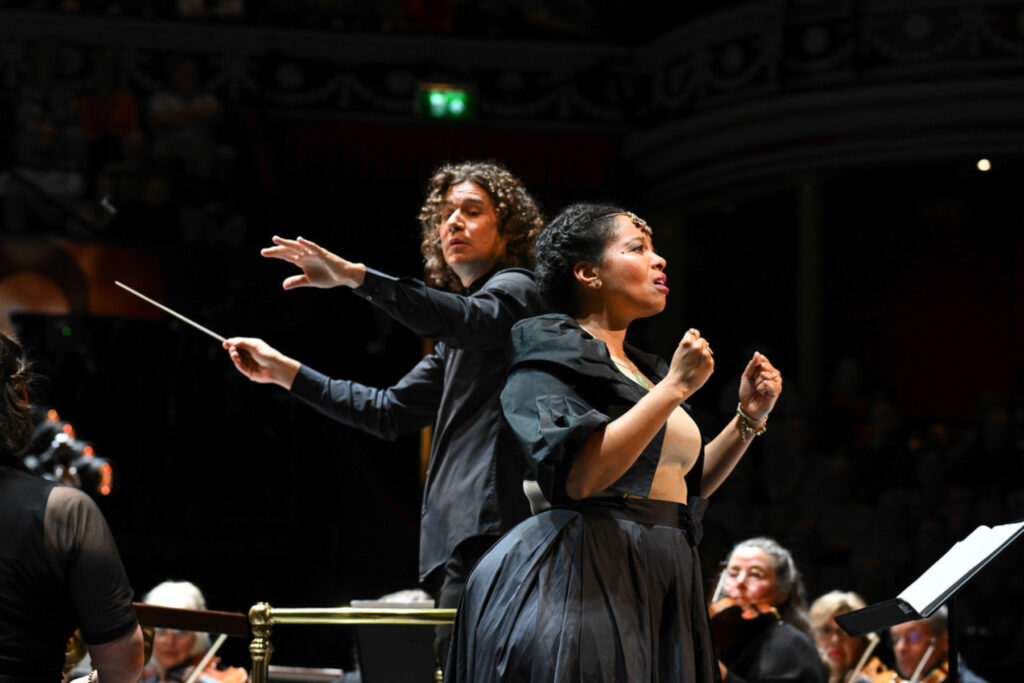You always remember exceptional voices when you hear them for the first time. I heard and reviewed Golda Schultz back in 2018 when she made her debut at the Proms. It was in the relatively small part of the soprano solo in Brahms’s Requiem. Yet, immediately, there was a clarity in her diction, a warmly lyrical vocal instrument and a natural stage presence which drew the listener in. Her mother named her after one of Israel’s most determined and resolute of prime ministers, Golda Meir, and there is still more than a touch of gold to what Schultz does with her voice.
In this unconventional and engagingly devised selection of vocal material from the 20th century, Schultz was partnered by the Chamber Orchestra of Europe, on fine form throughout, sympathetically conducted by Robin Ticciati. She started with Gershwin’s ‘By Strauss’. One of the last things Gershwin wrote, it picks up the origins of the musical theatre tradition going back to the explosion of Viennese operetta in the last quarter of the 19th century. Essentially, the lyrics by Ira Gershwin poke fun at attempts to supplant the growing popular successes of the American variant with anything comparable, including a nice line in self-deprecation, “And Gershwin keeps pounding on tin”, delivered with a succulent sneer by Schultz. The music too, in its meshing of melodic fragments by Johann Strauss, shows the hold the waltz continued to have over succeeding generations: “The waltz must be Strauss’, ja, ja, ja, Give me oom-pah-pah”. Schultz had the right degree of insouciance to underline all the fun qualities of the piece.

Schultz herself has likened this kind of mixed programme to the need to swap one pair of dancing shoes for another. Switching to Weill’s Youkali took us from the waltz to the tango, to a world of fairy-tale utopia which ultimately disappears in a puff of smoke. There was admirable characterisation in the narrative progression of the French text with a smoky colouring of the voice, reflecting some of the subtleties of instrumentation that include harmonium, piano and clarinet, and culminating in the force with which Schultz spat out the final two lines: “Mais c’est un rêve, une folie, Il n’y a pas de Youkali!” I would have preferred slightly more idiomatic attention to the nasality of the French vowels, but the vibrancy was there in spades.
Gershwin insisted that his masterpiece, Porgy and Bess, was not a musical but an opera. Schultz found all the dreamy, bluesy tenderness for Clara’s “Summertime” lullaby, allied to an impeccable legato line that soared effortlessly at the close in a sustained top A. Here, Ticciati was fully in tune with his soloist, caressing his strings like a hand gently stroking animal fur.
While he was working in Berlin (where he was one of Busoni’s pupils), Weill had established himself as an unashamed modernist. His many other talents soon emerged elsewhere in the developing American tradition of musical theatre, a genre into which he slipped to the manor born. Weill’s final Broadway piece came at the end of the 1940s and centred on an adaptation of Alan Paton’s novel Cry, the Beloved Country. There was a particular poignancy in hearing a South African soprano singing the title song “Lost in the Stars”, dealing as it does with a crisis of faith giving way to its final note of desperation: “And we’re lost out here in the stars”.

Schultz’s operatic credentials were fully on display in the longest item, “No word from Tom”, taken from Stravinsky’s The Rake’s Progress. It has a quite demanding tessitura, first given expression at the work’s premiere in 1951 by none other than Elisabeth Schwarzkopf (herself steeped in the Viennese tradition). Schultz glided seamlessly from Anne Trulove’s opening recitative to the attached aria, revelling in the coloratura elements and offering a buttery richness in her lower register. Ticciati in turn made the most of the wind sonorities at the start, one of Stravinsky’s typical calling-cards, together with the neoclassical rhythms and the astringency of the orchestration.
One of those many inter-war composers forced out by the Nazis and compelled to seek a living elsewhere was the prodigiously gifted Korngold, who moved from major operatic successes in Weimar Germany to the heady world of writing film music for Hollywood. Schultz next sang one of the key arias from his third opera, Die tote Stadt, in which a young woman called Marietta, who is the physical double of Paul’s late wife, picks up and develops his sense of grief and loss. Schultz imbued this aria, “Glück, das mir verblieb” with a compelling emotional intensity, her voice ascending majestically above the stave for “Wie wahr, ein traurig Lied”, yet the high quality was also there in Ticciati’s realisation of the orchestral accompaniment. The music progresses from a trance-like opening state, coloured by harp, celesta and shimmering strings, to a floating sensation at its close, with Schultz’s final phrase, “es gibt ein Auferstehn” (= there is a resurrection) turning initial despair into heartfelt conviction.
At the start of “Somewhere”, from Bernstein’s West Side Story, Schultz gave particular weight and emphasis to the first line, slightly at odds with the way the text normally steals into consciousness, but her voice opened out magisterially for “Hold my hand and I’ll take you there”.
Enclosing these seven vocal items were two purely orchestral pieces: Schreker’s Chamber Symphony and the 1945 version of Stravinsky’s ballet L’Oiseau de feu. The term chamber is inevitably an elastic one: Schreker stipulated a minimum of 24 players for his 1916 work, including an array of percussion featuring harp, piano, celesta and harmonium, but he recommended augmenting the number of strings for performances in larger halls. Here, I counted double that required number on stage. It can sound like a very long orchestral prelude to a grand opera (Schreker composed nine of those), and contemporary influences are undeniable. I noted echoes of Mahler’s Das Lied von der Erde in some of the woodwind writing, with prominent oboe solos beautifully played by Philippe Tondre, as well as Schoenberg’s Gurrelieder, all underlaid by an opulence in orchestration which owes much to Richard Strauss.
Chamber orchestras always take on a special challenge if they presume to play works written for full symphony orchestras. Stravinsky was canny enough to realise that there were financial gains to be had from recycling material from his very first ballet. Hence the slimmed-down 1945 iteration, which uses far smaller forces than those present in the original L’Oiseau de feu, but which includes material not part of the more familiar 1919 Suite. It is sometimes quipped that this ballet is the finest score that Rimsky-Korsakov never wrote; it certainly has all the colour and brilliance so characteristic of Stravinsky’s teacher. Ticciati adopted a pointillistic approach, highlighting the detail but sacrificing much of the atmosphere, super-light and super-suave at times, overly manicured in “The Princesses’ Round Dance”, and missing some of the weight and certainly the majesty at the close, where the final chords were brisk and unduly clipped, more typical of the composer’s later neoclassical period. The strings were antiphonally positioned, but with just 10 firsts and 8 seconds they were unable to summon up enough power to offset any of the brass-driven climaxes.
Some concert programming is predictable, hackneyed in fact. Full praise in this instance, however, to those who devised this intelligent and sage interweaving of vocal and instrumental pieces drawn from the first half of the previous century. It is the kind of approach that deserves repetition.
Alexander Hall
Golda Schultz sings Gershwin and Bernstein (BBC Proms 2025)
Schreker – Chamber Symphony; Gershwin – ‘By Strauss’; Weill – Youkali (Tango Habanera); Gershwin – Summertime (Porgy and Bess); Weill – Lost in the Stars (title song); Stravinsky – No word from Tom (The Rake’s Progress); Korngold – Glück, das mir verblieb (Marietta’s Song from Die tote Stadt); Bernstein – Somewhere (West Side Story); Stravinsky – The Firebird Suite (1945 version)
Golda Schultz (soprano); The Chamber Orchestra of Europe – conductor Robin Ticciati
Royal Albert Hall, London, 6 September 2025
All photos © Chris Christodoulou